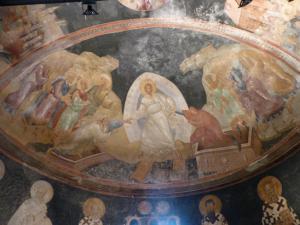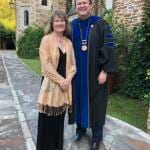 Wonder about difficult, good, true, and beautiful works, but wonder. Few artifacts of human creation are perfect, so even the best require critical examination. A perfect work cannot be harmed by our reasonable inquiry and a bad piece is exposed. The human soul grows and education gives that soul the needed matter for health.
Wonder about difficult, good, true, and beautiful works, but wonder. Few artifacts of human creation are perfect, so even the best require critical examination. A perfect work cannot be harmed by our reasonable inquiry and a bad piece is exposed. The human soul grows and education gives that soul the needed matter for health.
These assumptions have governed classical education for millennia. Great works, plays, films, books, music, are examined in a community. Guides shepherd toward new understandings and so the canon can grow. Each generation can add to the great works and so participate in a great, timeless conversation. Classical education works, but there are three mistakes that can limit effectiveness of the education we need.
A mistake is agonizing over a canon, or the right “books,” while failing to master the dialectic. The list of books worth deep exploration is very long and getting longer. Education in ideas and virtue necessitates learning through this hard skill of critical examination. Finding a mentor is far harder than picking a good book or piece of art! In fact, a good tutor can help us even if we have to start with something not-so-great. Asking good questions, helping prod us toward better answers that lead to even better questions is not easy. Obviously a great guide like Socrate is unlikely to be available!
What do we do?
A college or school must place first priority on finding people skilled in wondering. We should, if we can, get that knack and practice this questioning attitude in a community. The church is (or should be!) a great place to find like minded folks who continued to grow in mind and soul. Of course, a group that met to discuss a film, book, or work of art is not a church. Instead, we are learning, adding to the river of virtue by finding the streams of goodness in great works.
Sometimes a good novel can speak to us where a sacred text cannot.
We should include careful study of great Christian writers, the Fathers and Mothers of the church, and Scripture. This study is not the same as catechism, but a different good. Educational study allows us to love virtue with our whole minds. Education respects the texts enough to challenge. We examine, asking questions, with the respect we should show our own parents when we are adults, unafraid of disagreement. We wish for truth, we think we may all agree, but we ask our honest, hardest questions. We do not pretend to be persuaded of a truth, but wish to be fully and deeply persuaded. This is a lifetime education.*
A second error is to approach education in fear.
Most of us do not feel smart enough to read a book like Republic or understand the language of Shakespeare’s plays. Maybe we studied them once, a long time ago, but we feel rusty. Maybe we are, but that does not mean we cannot start. Even a little bit of understanding when it comes to a great book like Jane Eyre or the poetry of Langston Hughes is helpful. Our vocabulary grows and with that ability comes strength to more carefully discuss our joys and challenges. Grown up language for grown up problems! Saying “I love you” after thirty years of marriage can use all the help great musicians can give us. Watching challenging film or listening to opera for the first time expands our pleasures!
We do not need to fear! If this is “after school” nobody is grading us. There are no expectations. As for those still in college: pick a school that challenges, but makes wondering possible for as many as possible. Do not just get a credential. We do the best we can and most often what God can and will do with that educational offering is amazing!
Do not limit the dialectic approach to a few years of school or college.
Every college claims to prepare for lifelong learning. Do they? You should get a job skill in school. Our culture has added that requirement to education, but recollect that we cannot learn enough in four years to last a lifetime. We need habits of mind that can endure. Most importantly, we should keep reading, finding new forms of art and culture, expanding our tastes. God’s world is very big and has many voices! Most of the programs I have started have been for foundational learning. Our works were selected to deepen the knowledge of the roots of the language (English), political order (the United States), and religion (Christianity) that shaped the lives of our students. This is not enough, but only a start.
Having gained the habit of mind and the humility to approach great books with care, we must keep reading! When I learned that ancient Hellas was not just like my hometown, I began to learn how to approach a culture, time, and assumptions very different from anyone now alive! This should help us respectfully keep exploring. There really is no limit to the things we could learn to love! There are entire genres of music that wait to dialogue with us. We must keep wondering.
Wonder will last until the Wonderful comes. Until that great and awesome day, let us continue to grow, to challenge, to wonder in a way that will make us fit for that good End.
*For a Christian education is (and must be) combined with feeding the soul! Church and school are not the same and do not minister to the same parts of us.












